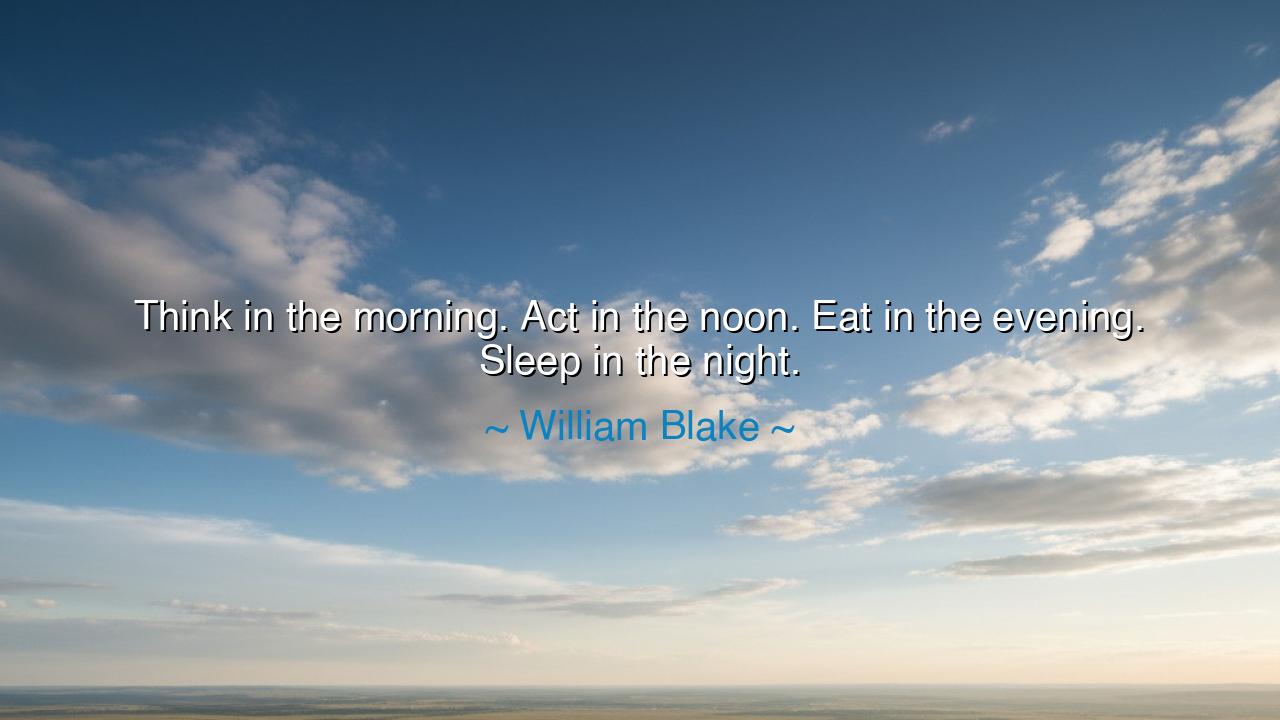
Think in the morning. Act in the noon. Eat in the evening. Sleep






William Blake, the mystic poet and prophet of vision, gave us this simple yet profound teaching: “Think in the morning. Act in the noon. Eat in the evening. Sleep in the night.” Though the words seem plain, they carry the depth of an eternal rhythm, the harmony of life lived in its proper order. Blake, who saw the world not only with eyes of flesh but with the fire of imagination, here speaks as a sage, teaching us to live in tune with the natural cycles that govern both the body and the soul.
The morning is the time of thought, for at dawn the mind is clearest, unclouded by the noise of the day. It is the hour of reflection, of prayer, of planning. The ancients knew this: philosophers rose early to meditate, monks to pray, generals to chart their strategies. To squander the morning is to miss the chance to direct one’s life with purpose. Blake calls us to think in the morning, for thought is the root of all action, and without it, even the strongest effort goes astray.
At noon, the sun is highest, and so too should be our actions. This is the hour of labor, when plans are brought to life, when energy burns brightest, and when man must act with vigor. The farmer toils in the field, the worker bends over his craft, the warrior enters battle—each in his own way harnessing the strength of the day. Blake tells us to act in the noon, reminding us that thought without action is but shadow, but action guided by thought is the foundation of greatness.
The evening is a time of rest and reward. After the toil of the day, Blake says simply: eat in the evening. This is not only about food for the body, but about nourishment for the soul. It is the time to sit with family, to share stories, to replenish what was spent in labor. In the evening, gratitude grows; one looks upon the day and receives its fruits. The ancients held feasts not only to fill their bellies but to honor life itself, giving thanks that another day had been completed.
And at last comes the night, when Blake instructs us to sleep. For sleep is not idleness but renewal. The body restores its strength, the mind weaves its dreams, the soul regains its balance. Those who defy sleep court ruin, but those who embrace it honor the rhythm of creation. Even the earth itself sleeps: fields lie fallow, seeds rest in the dark before rising again in spring. Night is not an end but a preparation for the dawn to come.
History offers countless reflections of this cycle. Consider the life of Marcus Aurelius, the Roman emperor and Stoic philosopher. In his Meditations, he wrote at dawn to sharpen his mind; by noon, he acted with justice in ruling; in the evening, he reflected and dined modestly; at night, he sought rest in the order of nature. Like Blake, Marcus Aurelius lived by the rhythm of the day, knowing that greatness is not chaos but harmony with time.
The lesson for us is clear: align your life with the natural order. Think in the morning, act in the noon, eat in the evening, sleep in the night. Let each hour serve its purpose, and you will live with balance, strength, and peace. Disorder comes when we reverse the order—acting without thought, eating without labor, seeking to sleep when we should rise. Harmony comes when we honor the sacred rhythm.
Therefore, let Blake’s words be your guide. Rise early, sharpen your thoughts; at noon, labor with strength; in the evening, rest and replenish; at night, surrender to sleep. For in this cycle lies the wisdom of the ancients, the strength of the present, and the promise of tomorrow. To live in rhythm with the day is to live in rhythm with life itself.






AAdministratorAdministrator
Welcome, honored guests. Please leave a comment, we will respond soon